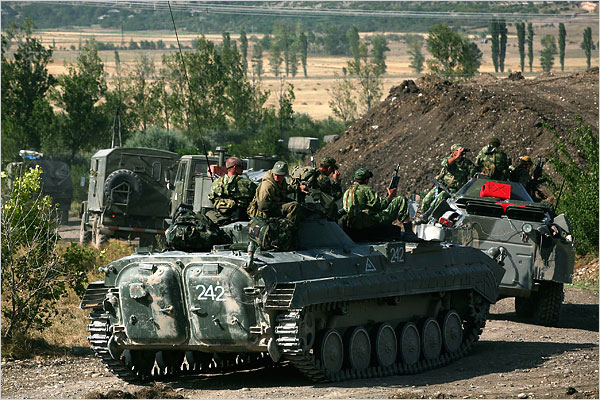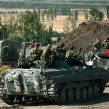
RUSSIA’S WAR ON GEORGIA IS AIMED AGAINST THE WEST
Publication: Eurasia Daily Monitor Volume: 5 Issue: 155
By:

For the fifth day running, Russian forces are pursuing their onslaught against Georgia. Russian troops have brutally advanced far beyond the so-called conflict zones, deep inside the country, occupying towns and villages and destroying Georgia’s infrastructure through aerial bombardments.
In addition, the Russian Navy has begun an economic blockade of Georgia. The Kremlin already imposed overland and air transport blockades between Georgia and Russia two years ago. Now, Russia has begun a maritime blockade as well.
This war is not simply about Georgia; it is far more than a Russia-Georgia conflict. This conflict is about the creation of a “Unbrave New World,” parallel and alternative to the Western world. It would be a domain policed by KGB alumni, regulated by Russian state energy monopolies, and expanded by military force through the incorporation of non-Russian territories. If allowed to expand as it now does in Georgia, this domain will soon become the power base for a direct Russian challenge to Western values and interests.
Georgia is now the foremost target of the Kremlin’s re-expansion project. Unless this project is resisted here, Georgia will become the birthplace of the Kremlin-controlled “Unbrave New World.” In that case, Georgia will also become the unmarked grave of major strategic initiatives that the United States, NATO, and the European Union have undertaken in the past decade: The Caspian energy transit to Europe, the strategic corridor from NATO Europe to Central Asia and Afghanistan, NATO enlargement, EU policies in Europe’s East, Silk Road projects, and democratic institution building in the Black Sea region.
All these aspirations and visions will be irretrievably lost if Georgia is allowed to fall. Georgia’s fall under Russia’s continuous blows would signify an historic rollback of the West from Europe’s East.
Hoping to stop the bloodshed, Georgian President Mikheil Saakashvili announced a unilateral ceasefire at 9:00 P.M. on August 7 (Georgian Public Broadcaster, August 7, 9:00 P.M.). Despite this, Russian-armed, Russian-commanded South Ossetian forces continued firing at and shelling Georgian villages and police, as well as the Georgian peacekeeping contingent. At least 50 lives—civilian, police and peacekeepers–were lost during two hours under this ceasefire. After 11:00 pm that evening Saakashvili ordered an end to the unilateral ceasefire because Russian troops in massive numbers, with tank columns and artillery, started streaming through the Roki tunnel from Russian territory into Georgia, across the internationally recognized border.
The Georgian leadership faced two options: First, hold the unilateral ceasefire and allow the Russian-led Ossetian forces to overrun or destroy Georgian controlled villages in South Ossetia, and do nothing until Russian troops came down from the Roki tunnel to join the carnage in a matter of hours. Or, second, to start fighting back and push the potential frontline as far north as possible.
The Georgian leadership chose the second option as the lesser of two bad options. On August 8 and 9 Russian forces overran South Ossetia, amid credible reports of rounding up local Georgians, while North Caucasus and South Ossetian paramilitaries committed acts of violence against unarmed civilians in the villages. From August 9 onward, Russian ground forces and aviation carried out operations deep inside Georgia, targeting both military and civilian sites.
In Abkhazia massive Russian forces were deployed from Russia’s interior by air as well as landing on ships of Russia’s Black Sea Fleet, which is based on Ukrainian territory. This move constitutes an overt breach of the Ukrainian-Russian treaties regarding the stationing of the Russian Fleet, as well as a violation of Ukraine’s non-block status, which Russia otherwise claims to support. All these moves are destroying any basis for the rule of international law in large parts of Europe’s East and Black Sea region. Those in the West who pinned hopes on President Dmitry Medvedev to respect the rule of law, internally and internationally, will have to admit the failure of such hopes.
Russia has already added substantial portions of Georgian territory to the portions it already controlled. With or without active offensive operations in coming days, Russia is poised to issue ultimatums that Georgia as a sovereign country would be unable to accept. Through such an ultimatum, Russian troops seized the Georgian town of Zugdidi and have indicated that they would continue military pressure until Georgia signs a cease-fire agreement on Russian terms.
Within the cease-fire agreement, Moscow will almost certainly demand provisions to control political decision-making by the Georgian government on national security issues. European Union and OSCE mediators must shield Georgia from any Russian-imposed cease-fire agreement that could be turned into a Russian mechanism of influencing Georgia’s sovereign decision-making prerogatives.




